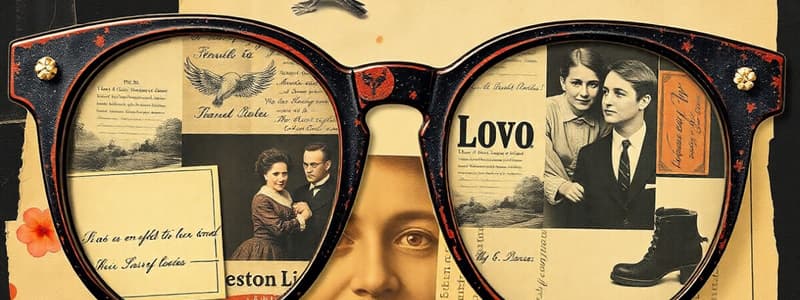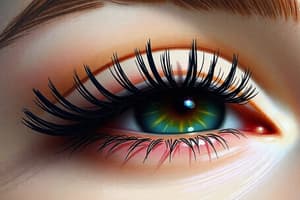Podcast
Questions and Answers
What were reading stones developed for?
What were reading stones developed for?
- Protecting eyes from dust
- Helping monks in reading and writing (correct)
- Enhancing vision in bright light
- Creating decorative glass objects
Who is recognized as the father of modern optics?
Who is recognized as the father of modern optics?
- Abbas Ibn Firmas
- Alessandro Della Spina
- Johannes Kepler (correct)
- Marco Polo
In what time period were eyeglasses first believed to have been produced?
In what time period were eyeglasses first believed to have been produced?
- 1285-1289 (correct)
- 17th century
- 1000 A.D.
- 1400s
What material were the first eyeglass frames made of?
What material were the first eyeglass frames made of?
According to Chinese beliefs, what was said to be contained within lenses?
According to Chinese beliefs, what was said to be contained within lenses?
What significant observation did Marco Polo make regarding eyeglasses?
What significant observation did Marco Polo make regarding eyeglasses?
Which statement best describes the innovations in eyeglass production in Florence, Italy during the 1400s?
Which statement best describes the innovations in eyeglass production in Florence, Italy during the 1400s?
What was a common practice for eyeglass prescriptions as users aged?
What was a common practice for eyeglass prescriptions as users aged?
What is the primary purpose of the Snellen Eye Chart?
What is the primary purpose of the Snellen Eye Chart?
Which of the following pairs of spectacles was developed during the 18th century?
Which of the following pairs of spectacles was developed during the 18th century?
Who introduced the first contact lenses that resembled modern gas permeable contact lenses?
Who introduced the first contact lenses that resembled modern gas permeable contact lenses?
What significant event in the field of optometry occurred in Minnesota in 1901?
What significant event in the field of optometry occurred in Minnesota in 1901?
Which of the following materials were used in the first plastic contact lenses introduced in 1938?
Which of the following materials were used in the first plastic contact lenses introduced in 1938?
What treatment method was used for leukoma, a white spot on the cornea, in ancient Egypt?
What treatment method was used for leukoma, a white spot on the cornea, in ancient Egypt?
Which condition was often treated with ointments in ancient Egyptian medicine?
Which condition was often treated with ointments in ancient Egyptian medicine?
In what year did Rhode Island approve the DPAS in optometry?
In what year did Rhode Island approve the DPAS in optometry?
What was the main focus of eyeglass production in the 20th century in America and Europe?
What was the main focus of eyeglass production in the 20th century in America and Europe?
What was a notable use of blindness in ancient Egyptian culture as depicted in paintings?
What was a notable use of blindness in ancient Egyptian culture as depicted in paintings?
Flashcards are hidden until you start studying
Study Notes
Origin of Eyeglasses
- Around 1000 A.D., the earliest magnification techniques emerged, paving the way for eyeglasses.
- Reading stones were the first visual aids, initially developed to assist monks with reading and writing.
- Alessandro Della Spina, a Dominican monk, foresaw the usefulness of lenses for the elderly and the visually impaired.
- Between 1285 and 1289, the first eyeglasses were believed to have been crafted by medieval artisans in Pisa, Italy, featuring bone, metal, or leather frames in an inverted "V" shape.
- Eyeglasses symbolized wisdom and sanctity during the medieval period.
- The first spectacles with frames and sidebars likely originated in Pisa in 1268, coinciding with depictions of magnifying glasses in frescoes by Tomasso da Modena in 1352.
- Marco Polo reported seeing older individuals using eyeglasses in 1271, noting their long-standing existence in China.
- Chinese historians linked the introduction of eyeglasses in China to Arabia around 1071, attributing magical properties to the lenses.
- Abbas Ibn Firmas, a 9th-century figure, developed methods for producing clear glass and is credited with the early use of corrective lenses.
- Florence, Italy, became a center for eyeglass production and innovation in the 1400s, with prescriptions needing adjustments every five years.
- Johannes Kepler, known as the father of modern optics, contributed significantly to optics in 1604 and invented the Keplerian telescope.
- In the 17th century, Germany gained prominence in eyeglass frame manufacturing while Italy retained the lead in lens production.
- The first modern-style glasses were developed by Edward Scarlett in 1730.
- Benjamin Franklin introduced bifocal lenses in 1784 due to his own vision problems.
- The 18th century saw the creation of the lorgnette (a glasses with a handle) and the rise of the monocle in the 19th century, particularly in Germany and Russia.
- George Airy, in 1825, developed lenses for astigmatism, successfully correcting his own vision in 1827.
- Hermann Von Helmholtz invented the ophthalmoscope and ophthalmometer in 1851 to examine the eye, significantly impacting vision examination.
- Charles Babbage designed an instrument resembling the ophthalmoscope, marking advancements in vision analysis.
- Herman Snellen created the Snellen Eye Chart in 1862, widely used for vision diagnosis and lens prescription determination.
- J.W. Verschoor coined the term "optometry" in 1865 from his research on optometers, influencing the field's development.
- The first optometry school, Chicago College of Ophthalmology and Otology, was established in 1872.
- Charles Prentice, known as the father of optometry, published a pivotal book on ophthalmic lenses in 1892.
- Innovations in contact lenses began with John Herschel's proposal for eye molds in 1827, eventually leading to glass contact lenses by F.A. Muller and others in the late 1800s.
- Scleral lenses, combining glass and plastic, were introduced by William Feinbloom in 1936.
- Kevin Tuohy launched modern gas permeable contact lenses in 1948.
- Various milestones in optometry included Minnesota recognizing the profession legally in 1901 and the establishment of the National Board of Examiners in Optometry in 1951.
- The evolution of eyeglasses in the 20th century focused on functionality, comfort, and style.
- Historical texts like the Ebers and Edwin Smith papyrus from ancient Egypt detailed eye ailments and treatments, showcasing early medical knowledge related to vision.
- Conditions such as chronic trachoma and leukoma were documented in these texts, with treatments involving various natural substances.
- Ancient Egyptian practices included treating eye-related issues with ointments and herbal remedies, also indicating the significance of blind musicians in society.
Studying That Suits You
Use AI to generate personalized quizzes and flashcards to suit your learning preferences.




